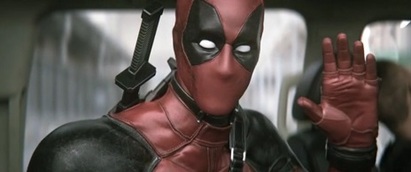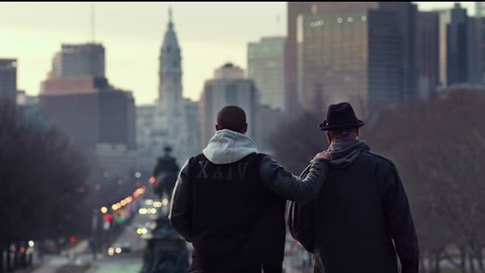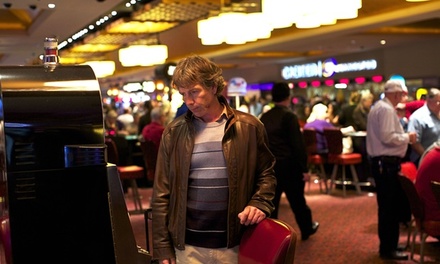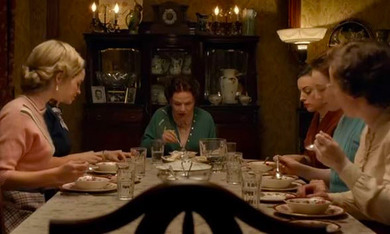Depictions of gambling addiction are often hard for this viewer to stomach. I've walked past an empty craps table and felt the pull of the dice, and I've stayed at blackjack tables past the point where I'm having any fun. Short of some ironclad financial discipline, I can imagine a scenario where a weakness for the instant gratification that gambling can provide takes an ugly turn. Seeing exactly that happen onscreen hits close to home. Mississippi Grind captures the highs of gambling, rushes so powerful that everything else slips away and possessing the means to recreate it becomes more important than dignity or shame. It also captures the crushing feeling of the bad beat, and the intense self-loathing that goes along with it. Anna Boden's and Ryan Fleck's fourth collaboration, and their second about some kind of dependency, is one of the best depictions of gambling I've ever come across, while also bringing the kind of emotional honesty that I've come to expect from their work.
|
Depictions of gambling addiction are often hard for this viewer to stomach. I've walked past an empty craps table and felt the pull of the dice, and I've stayed at blackjack tables past the point where I'm having any fun. Short of some ironclad financial discipline, I can imagine a scenario where a weakness for the instant gratification that gambling can provide takes an ugly turn. Seeing exactly that happen onscreen hits close to home. Mississippi Grind captures the highs of gambling, rushes so powerful that everything else slips away and possessing the means to recreate it becomes more important than dignity or shame. It also captures the crushing feeling of the bad beat, and the intense self-loathing that goes along with it. Anna Boden's and Ryan Fleck's fourth collaboration, and their second about some kind of dependency, is one of the best depictions of gambling I've ever come across, while also bringing the kind of emotional honesty that I've come to expect from their work.
0 Comments
The best films of 2015 looked back. Mad Max: Fury Road and Creed added diversity to a well-worn foundation and were all the more vital for it. Spotlight may as well be a spiritual sequel to All The President’s Men. John Crowley’s Brooklyn tells a classic immigrant story with the protagonist torn between her ancestral and her chosen home, one that is easy to imagine being directed by a Wilder or a Capra. Brooklyn is the kind of film one could take their conservative grandmother to go see, and despite the generational gaps, both viewers would likely be transported into a simple and beautiful story of America.  Hi doggie. Hi doggie. by Phil Crone “Deadpool” is going to grab headlines and long be remembered as the movie that proved a hard R superhero movie will lure audiences when done well. I hope that that isn’t the only lesson learned here. Deadpool deftly weaves a tale of a flawed hero and villain within genre-defying violence and equally raunchy humor for a crowd-pleasing package with more of a soul than it has any right to have. Deadpool has been billed as a different superhero, fond of over the top violence and humor that pushes all boundaries of good taste. No punches are pulled for the genre – this movie earns its R rating gleefully. The jokes are rapid-fire and relentless to the point where it’s easy to miss entire chunks of the movie as they are drowned away in laughter. The majority of the best lines come at the expense of the genre, especially the X-men movies themselves. You don’t need a great familiarity with other superhero movies to get the bulk of the references, but fans of the genre will certainly appreciate them more. Unfortunately, several lines do miss the mark, mostly thanks to being too sophomoric. This is a major problem in the first third of the movie, but luckily, this falls off. The violence is certainly hard and heavy, but I wouldn’t call it gross by any measures. “Kingsman” still has Deadpool beat from that standpoint. Gratuitous for sure, but not overplayed just because the movie can get away with it. The bulk of the violence is of course played for laughs and works well. While it would be commendable for Deadpool to just nail the major beats and have fun, what pushes it into the upper stratosphere of the genre is how it treats its titular hero. Deadpool is an unstable personification of id, and his journey never lets the audience forget that. Both he and his antagonist Ajax’s motivations are the basest of human emotions and flaws: vanity, pride, wrath, and greed. These thread their way through the action of the story, resulting in something that ultimately is more interesting than your typical superhero fare that you’d see in other origin stories. Deadpool is self-assured, and he stays that way right until the conclusion that was true to the characters built in this world. However, from an action and spectacle standpoint, it was a little underwhelming given that we live in a post-Avengers world. That can be written off to the rather paltry $58 million budget, and I’m sure Deadpool 2 will remedy this. The story remains fully focused on Deadpool, and the supporting characters help fill out that character. It would have been easy to gloss over the relationship between Wade and Vanessa, but I enjoyed the lengths the movie went to to show the uniqueness of their relationship. Colossus could have easily been mutant filler, but having him as Deadpool’s “angel on the shoulder” was smart and resulted in some great moments. Ajax, as previously mentioned, is a villain with understandable motivations used as an effective parallel to Deadpool. The remainder are there for either comic relief (Weasel, Blind Al) or battle filler (Negasonic Teenage Warhead, Angel Dust), and they accomplish their goals. Ultimately, Deadpool is better than it has any right to be, and it meets the lofty expectations placed upon it. It could have been nothing more than a laugh-a-minute bloodfest and been perfectly fine. However, it takes a character that shouldn’t be interesting enough to warrant his own story and turn it into a potential franchise. Now, who’s going to play Cable in Deadpool 2? Grade: A  By Jon Kissel The prospect of the long-hiatus-sequel or the franchise reboot usually indicates how big studios are largely out of ideas. When those two trends are combined, it's doubly a cause for concern. However, amdist the messy Spider-men and legacies of Tron, the needle in the haystack is sometimes found. In Ryan Coogler's Creed, which resurrects the Rocky franchise while installing a dynamic new lead, there's no whiff of crass opportunism or nostalgic exploitation. Instead, there's the real sense of a story worth telling about characters that required either an introduction or a new chapter. Coogler's film opens on Adonis Williams as a child, fighting amongst his peers in an LA youth facility. Between foster homes, young Adonis is visited by Mary Anne Creed (Phylicia Rashad), widow of heavyweight champ Apollo Creed. She feels obligated to take Adonis in, as he is the child of Apollo's mistress. Flash forward several years, and the now-adult Adonis (Michael B. Jordan) still uses his non-famous surname to fight in underground Mexican bouts. Ready to become a professional boxer, the LA trainers won't take him due to his high economic status and his adoptive mother hates the idea after witnessing what the sport did to her husband. With no one to train him, Adonis heads to Philadelphia to find Rocky Balboa (Sylvester Stallone) and hopefully learn from his father's old friend. Once in Philadelphia, Creed becomes a more recognizable film, adhering to a sports-movie structure, albeit one with exceptional characterization. Training, small match, bit of fame, big match announced, more training, big match. Coogler hits the plot beats, updating the formula that the original Rocky film helped cement in pop culture, but with eye-catching photography and a thrilling score that retains the iconic Gonna Fly Now frame while adding new beats and rhythms. Creed contains several impressive shots, including a centerpiece one that captures an entire fight in one take, flitting around the ring and capturing all the action from beginning to end. A later single shot follows Adonis and his entourage as they make a long walk through the bowels of an arena, seemingly extraneous but worth it for the anticipation it builds and as a symbol of the characters' journeys. Adonis's status as a light heavyweight means that the viewer is treated to faster choreography than the lumbering heavyweights of every previous Rocky incarnation, so more punches are thrown and there's more emphasis on athleticism than sheer strength. The inherent cinematic quality of boxing applies to training scenes, too, and boxing montages are my favorite kind in the world of sports. In keeping with the body horror aspect of the franchise, Creed also never forgets how bloody boxing is, as burst blood vessels in eyes accompany characters or outright puddles of bloody spit adorn the ring. In between those plot beats, it is a pleasure to indulge in the laconic scenes Coogler gives the characters. Jordan and Stallone share a playful back-and-forth in more avuncular scenes and an honest pathos in more emotional scenes. Tessa Thompson plays Bianca, Adonis's version of Adrian and a singer on the upswing of her career. Where Adrian was a mousy and beaten-down woman who mostly served as support for Rocky, Bianca could warrant her own film. A musician gradually losing her hearing, she serves as a mirror to Adonis, who is also attempting to fit a career into a slowly-closing window. Thompson and Jordan have a sultry chemistry between them that considerably brightens the film. In the background, Adonis's two eventual opponents and the personnel around them are given appropriate shading, as enough information is doled out to make them recognizable instead of just faceless obstacles to be tackled. Coogler and co-writer Aaron Covington leave no corner of the world unexamined, and their film is richer for it. Creed features a star-making performance from Jordan, just as the original Rocky did for Stallone. Jordan makes Adonis into a complete person, stubborn but vulnerable, angry but tender, intense but charismatic. Even with 3% body fat and a boxer's physique, he has never lost the innocence in his eyes that marked his tragic character on the Wire, and he brings it out here to great effect. Credible as a romantic lead and in the ring, Jordan easily anchors the film and makes the possibility of future sequels a fait accompli. As the elderly Rocky, Stallone surprisingly shares Jordan's vulnerability. Everyone around him has died or dropped out of contact with him, and his loneliness in a city where he's on a first-name basis with strangers is deeply painful. Until Adonis arrives, and for some time after, all that's left for him is marking time until something stops working. Thompson, already on my radar after her strong turn in Dear White People, is enthralling, with her thoughts dancing across her eyes as she decides how deep to dive in with Adonis. Lastly, Rashad is a capable moral center who makes a meal of her too-few scenes. Providing true and lived-in reasons why Adonis should not follow in his father's footsteps, she has a wise and earned clarity, but also understands how hard to push and when to surrender. Coogler treats her with eminent fairness, despite the character's wish that the events of the film never happen. Creed rockets up the list of favorite sports films, bringing a shocking amount of life to a franchise that is entering its fifth decade. It nails the euphoria that competition so often traffics in, guided along by a passionate performance from Jordan and a cautiously optimistic one from Stallone. With this and his debut of Fruitvale Station, Coogler deserves to be on the short list of young directors, and after two superlative outings, may well find himself in the auteur pantheon. Creed is a film that works, succeeding in every aspect and never indulging in a false moment amidst a genre that is hip-deep in them. A- |
Side PiecesRandom projects from the MMC Universe. Categories
All
Archives
April 2023
|


 RSS Feed
RSS Feed